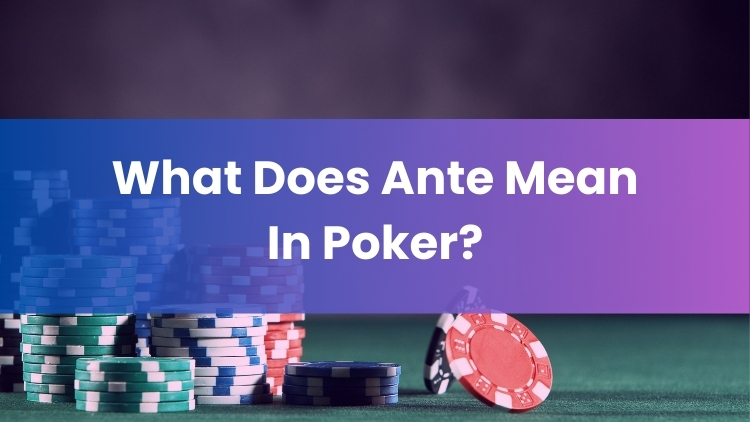
Poker is an exciting game; however, there are many phrases and terms that can make it confusing, especially for those new to the game.
One common term that you will come across when playing poker is the "ante" bet. This term can spark confusion amongst players, so what exactly does it mean?
In this blog post, we'll explore what this term means, helping you understand how to incorporate this element into your game for an enjoyable poker experience.
What Is Ante In Poker?
An "ante" is a small, mandatory wager that all players at the poker table must place before a hand begins, ensuring there's always something to play for and encouraging more active participation in each round.
Every player contributes an equal amount to the pot before the first cards are dealt, which is usually quite small compared to the bets you may see later in the game.
An ante differs from blinds, which are also pre-hand bets. While blinds are paid by only two players each hand, the ante is paid by everyone, making it part of a shared responsibility to keep the game moving.
In some variations of poker, such as tournament settings, the "big blind ante" has become common. This means the player who pays the big blind pays the ante for everyone, simplifying the game’s pace.
Understanding antes is crucial because they have a direct impact on how you may choose to play your cards. With an ante in place, the pot already has some money in it, which could influence your decisions and strategy during the game.
Who Pays The Ante In Poker?
In poker, when an ante is required, every player at the table must pay it, meaning each person contributes an equal amount to the pot before any cards are dealt.
The ante amount is generally determined by the rules of the game or the stakes set by the players. It's often a small portion of the minimum bet, designed to keep the game moving and encourage more active participation.
The ante is a shared responsibility among all players, helping to build the pot from the start, giving you more incentive to play your cards strategically.
If you choose not to pay the ante, you'll miss out on playing that hand, as it's a mandatory part of many poker games. Being ready to ante up is essential if you want to stay in each round, so understanding who pays the ante ensures you're well-prepared to play the game fairly.
What Is The Purpose Of Ante?
The main purpose of an ante in poker is to ensure there is always something to play for in every hand. By requiring each player to contribute a small, equal amount to the pot, the ante incentivises players to participate actively rather than folding too often.
Having an ante makes each hand more competitive from the start. Since everyone has some money already on the line, players may be more motivated to play strategically and make bold moves to potentially win the pot.
With some money already in the pot, players are more likely to make moves quickly, keeping the game from dragging on and maintaining a lively pace.
While it may seem like just a small contribution, the collective effect of antes ensures that the game is constantly moving and the stakes feel meaningful, adding to the entertainment and challenge of poker.
How Do You Ante Up In Poker?
To "ante up" in poker is to add your required share to the pot before the game hand begins. This may sound straightforward, but it's a crucial step to ensure the game starts smoothly.
Before any cards are dealt, all players at the table need to pay the ante to create a base amount that players will compete for in the hand. The ante is a small, fixed amount, and it’s usually determined by the game's rules or what the players have agreed upon before starting.
In a casino, the ante requirement will be displayed on the table or communicated by the dealer. In a friendly home game, it may be a joint decision by the players, so make sure you know the ante amount beforehand so you’re prepared to contribute.
If you're playing in person, you'll typically place your chips in front of you to indicate your ante. The dealer or a designated person will then collect everyone's antes and place them in the centre of the table to form the pot.
Online poker simplifies this process, as the system will automatically take the ante from your virtual chips or credits, ensuring a seamless start every time.
It’s important to remember that paying the ante is mandatory if you want to play the hand, so always checking your chips or credits to ensure you can meet the ante is always a good decision.
With your ante paid, you can focus on playing the best hand possible, whether you’re a beginner aiming to learn or a more experienced player looking to hone your skills.
Always remember to gamble responsibly for an enjoyable poker experience. Ensure your poker experience remains safe and entertaining by setting limits to your playing time, sticking to a strict budget within your means and making use of any responsible gambling tools available.
*All values (Bet Levels, Maximum Wins, etc.) mentioned in relation to this game are subject to change at any time. Game features mentioned may not be available in some jurisdictions.
**The information provided in this blog is intended for educational purposes and should not be construed as betting advice or a guarantee of success. Always gamble responsibly.
